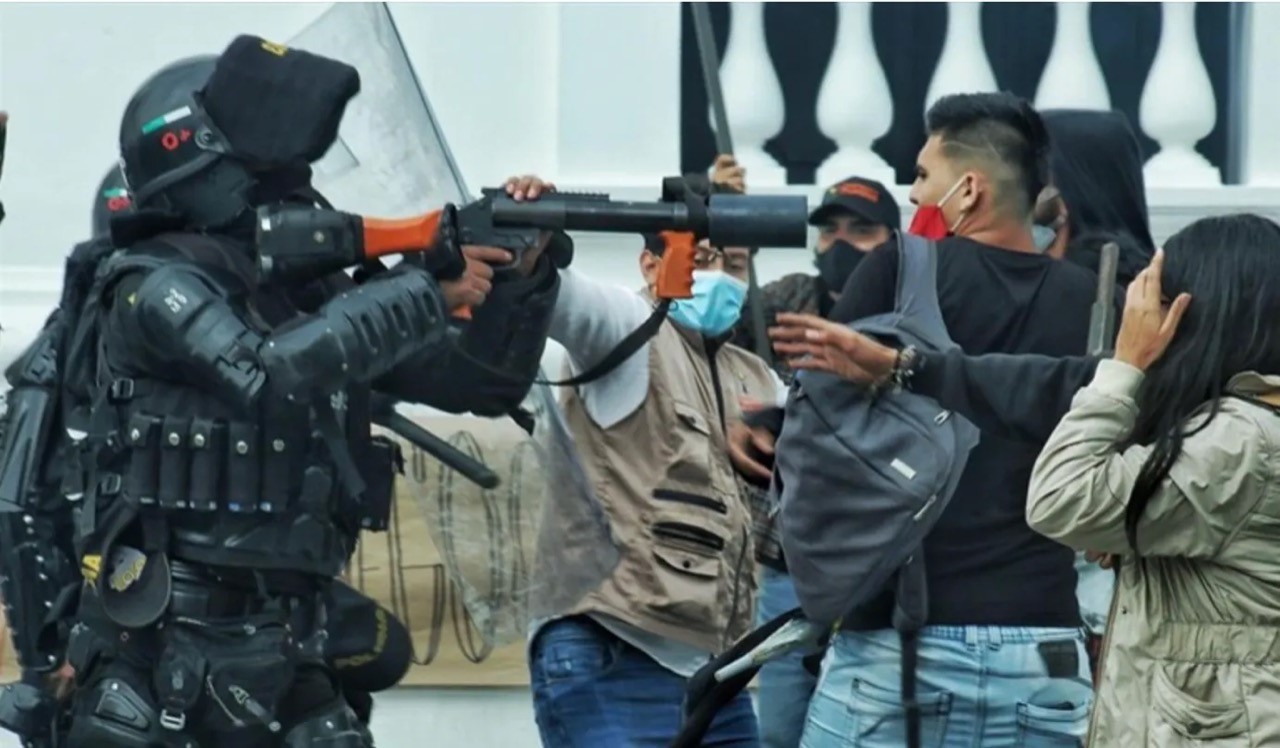Since November 2019 Colombia has been experiencing intense days of social protests: The COVID-19 pandemic and the subsequent lockdown movement restrictions in 2020 failed to contain popular outrage. Protests continue to fill the streets. The national strike in 2021 was the greatest expression by the people for the need for change in Colombia. Sadly, the people’s need for change has been met with brute force and violent repression by the law forces. The poor are most affected.
The systematic human rights abuses committed by state agents in the context of the protests have led bodies such as the Inter-American Commission on Human Rights (IACHR), the United Nations Special Rapporteurs, the Office of the United Nations High Commissioner for Human Rights (OHCHR), the European Union (EU) and the various embassies of several countries to direct their attention towards Colombia.
Reports from the OHCHR, IACHR and human rights observatories point to what is already known that the Colombian state response is characterized by excessive and disproportionate use of force. In the context of the 2021 national strike, the United Nations received complaints because of the death of 63 people, 76% of them due to gunshot wounds. The High Commission reported that between April 28 and July 31, 46 people were murdered, of which 44 were civilians and 2 police officers. “Reasonable doubts” are retained to affirm that at least 28 of these deaths were committed by police agents and that at least ten deaths were linked to the brutal actions of the Mobile Anti-Riot Squadron of the National Police[1].The numbers reported by the Colombian organizations are higher – at least 89 demonstrators killed; 106 victims of gender-based violence; about 1,929 people injured and 3,547 arrests linked the national strike[2].
The information documented by the agencies also brought to light targeted excessive use of force against the poor, particularly from the peasant, indigenous, and Afro-descendant communities. This clearly showed that the police operate in a classist and racist manner. Most of the people who died during the April 28 national strike were young people between the ages of 17 and 26 living in disadvantaged and marginal neighborhoods, children of peasant, indigenous, and Afro-descendant parents displaced by violence, youth dedicated to informal trade, artists, athletes, students, or people who had dropped out of school.[3]
This was also acknowledged by and reported in the report of the Rapporteur for the clarification of the events of the demonstrations of September 9 and 10, 2020. The report pointed out that the way of acting of “the National Police caused a massacre which took the lives of 11 young people.[4] The document further showed that most of the victims were young people between the ages of 17 and 27 from the popular neighborhoods of Bogota and Soacha. It concludes that there is a criminalization of poverty coming from the police and invites reflection on repressive and authoritarian behavior towards low-income citizens.
Photo: Consejo Regional Indígena del Cauca – CRIC
[1] Colombia: La ONU llama al gobierno a garantizar la justicia y brindar reparación a las víctimas de las protestas. Recuperado de: https://news.un.org/es/story/2021/12/1501462
[2] Defender la libertad asunto de todos (2021). El sometimiento de la democracia. Un balance del derecho a la protesta social en Colombia en el año 2021. Disponible en: https://documentcloud.adobe.com/link/track?uri=urn:aaid:scds:US:6710a368-d494-4597-92f9-f5a51177aa54#pageNum=1
[3] Oficina del Alto Comisionado de Naciones Unidas para los derechos humanos (2021), El Paro Nacional 2021: lecciones aprendidas para el ejercicio del derecho de reunión pacífica en Colombia. Disponible en: https://www.hchr.org.co/index.php/informes-y-documentos/documentos/10246-documento-lecciones-aprendidas-paro-nacional-colombia-2021-juliette-de-rivero-representante-de-la-alta-comisionada
[4] Informe Final para el esclarecimiento de los hechos ocurridos los días 9 y 10 de septiembre de 2020. Disponible en: https://bogota.gov.co/mi-ciudad/administracion-distrital/informe-para-esclarecimiento-de-hechos-del-9-y-10-de-sep-de-2020
This post is also available in Français.

